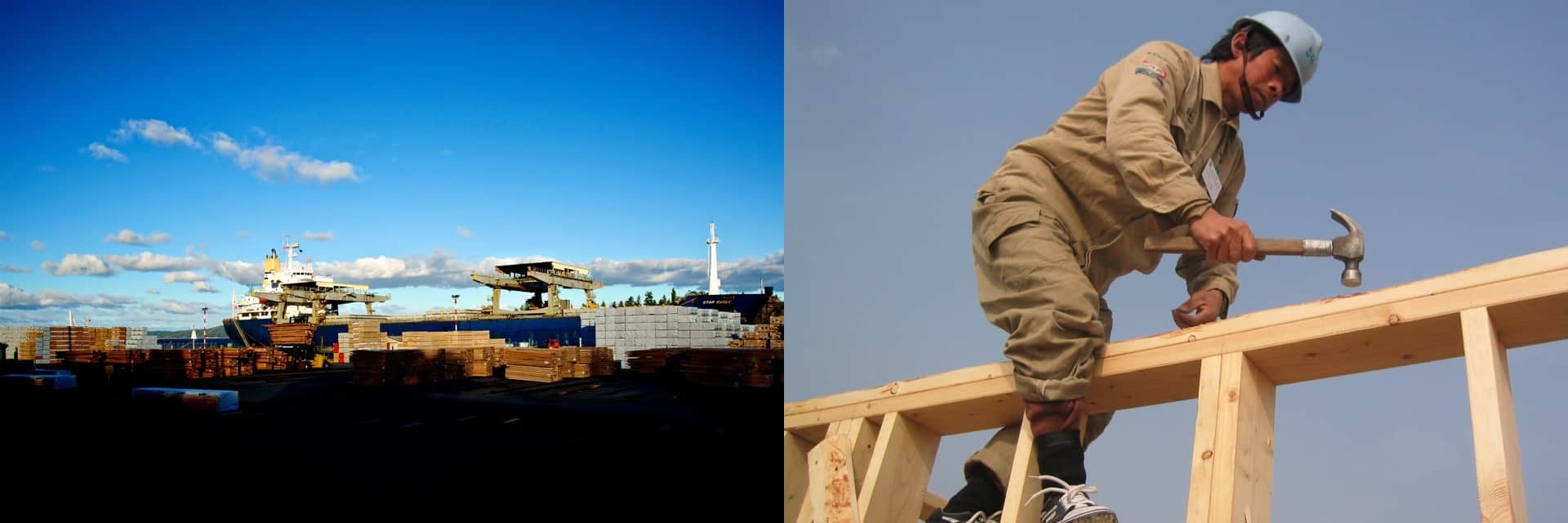
TOP EXPORT MARKETS FOR B.C. FOREST PRODUCTS
- USA (56%)
- China (24%)
- Japan (7%)
- South Korea (2%)
- EU (2%)
B.C. producers know how to build and nurture strong trading relationships around the globe
USA: Due to its close proximity, the U.S. has historically been our primary market. However, as housing starts began to slow after 2005, exports to the U.S began to decline, and BC actively made efforts to diversify its overseas markets. Today, 56% of BC forest products go to the US.
China: In an effort to diversify our markets, BC has successfully established China as the largest offshore market for our forest products. Today, almost one quarter of all BC forest products go to China. Through Canada Wood COFI has a presence in two offices in China (Shanghai and Beijing) to support market outreach and development.
Japan: Japan has a long history of importing Canadian lumber. Today, Japan is Canada’s second largest overseas lumber market, and by country Canada is Japan’s largest supplier of softwood lumber. Japan builds over 100,000 wood frame homes and approximately 350,000 traditional Japanese styled post and beam wooden homes per year. Due to a decrease in single family homes and Japan’s aging population, the demand for wood use in apartment buildings and elderly care housing is growing and other forms of institutional and non-residential construction is growing. COFI supports this important market through its Tokyo office of Canada Wood.
South Korea: The South Korean market continues to grow in both volume and diversity of the products it imports. Wood frame housing starts in South Korea have been increasing steadily. BC is one of South Korea’s largest supplier of softwood lumber products, OSB and value-added products. COFI maintains a Seoul office of Canada Wood.
Europe: Through the Canada Wood office in the United Kingdom, COFI closely monitors codes and standards as well as providing support to industry, trade, specifiers, designers and the public.
India: There is growing opportunity for BC forest products in India, which is the world’s fastest growing economy. Although lumber shipments to India are small, export figures are increasing rapidly in this market. COFI is working to promote trade with India and expects that India will become a major market for BC forest products.
B.C. forest products make up 28% of the province’s total exports
Export: 28%
Lumber: 47%
Pulp: 25%
Other: 23%
All paper products: 5%
BC’s Interior is best known for its spruce, pine and fir species, commonly referred to as SPF. The highest-quality logs are used for lumber or other solid wood products, often used in residential and commercial construction. SPF has long been popular for use in wood-frame construction in North America, and wood-frame construction is expanding in Europe and Asia due to its economic and durable construction. By-products such as chips, sawdust, hogfuel and lower-quality logs are used for pulp, paper, panels, pellets and energy.
We work with partners to grow and expand our markets
COFI has been a leader in developing our markets overseas, having first set up an office in Tokyo in 1971. Since then, the B.C. forest sector has continued to work in partnership with Canada Wood, the B.C. Government (B.C. Forestry Innovation Investment) and the Government of Canada (Natural Resources Canada) to grow our overseas markets. We have advised on wood building codes and wood product standards in Asia, as well as provide training in designing and building with wood.
Useful Links & Resources
Blog:
Canada Wood Today
Stay current. Sign up for regular email updates from the team at COFI.

TEL: 604-684-0211
EMAIL: info@cofi.org


